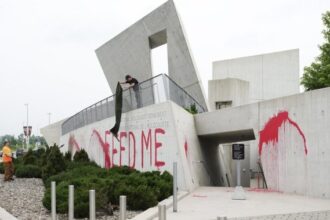In the quaint villages and historic towns across the Netherlands, a special contingent of Canadian youth has arrived to commemorate one of the most significant chapters in Canadian-Dutch relations. As the Netherlands prepares to mark the 80th anniversary of its liberation from Nazi occupation next spring, 22 Canadian high school students are walking the same paths that Canadian soldiers tread during those pivotal days of 1945.
“It’s overwhelming to stand where Canadian soldiers once stood,” said 17-year-old Emma Thompson from Burlington, Ontario, her voice catching slightly as she surveyed the meticulously maintained Groesbeek Canadian War Cemetery. “These weren’t just soldiers – they were teenagers and young men not much older than we are now.”
The student delegation, selected from across Canada through a rigorous application process by the Juno Beach Centre Association, is participating in a week-long program called “Canada’s Liberation of the Netherlands.” Their journey takes them through battlefields, war cemeteries, and communities where Canadian forces fought to free the Dutch people from five years of brutal German occupation.
At the Canadian War Museum in Ottawa, where the students began their educational journey before departing for Europe, historian Dr. Robert Henderson emphasized why this experience matters. “The Netherlands campaign represents one of Canada’s most significant military contributions in World War II, yet it remains somewhat overshadowed by D-Day in our collective memory,” he explained. “More than 7,600 Canadian soldiers died in the nine-month campaign to liberate the Dutch.”
What makes this connection particularly poignant is the enduring gratitude the Dutch people maintain nearly eight decades later. In the town of Holten, local resident Johanna van der Meer, 85, still remembers Canadian soldiers distributing chocolate to starving children. “I was just a small girl, but I never forgot their kindness,” she told the students during an emotional gathering. “We taught our children and grandchildren to remember Canada’s sacrifice.”
The program doesn’t shy away from difficult truths about world events and war. Students visited the Anne Frank House in Amsterdam and participated in workshops examining the Holocaust’s impact on Dutch Jewish communities. They’ve also discussed contemporary global conflicts, drawing parallels and distinctions with historical events.
“What’s striking is how this isn’t just ancient history to the Dutch people,” noted program coordinator Michael Bechthold. “Every May 5th, Liberation Day is celebrated with genuine emotion. Canadian flags still line streets in some towns, and many Dutch families continue traditions of tending Canadian graves.”
The timing of this educational initiative is particularly significant as fewer World War II veterans remain to share firsthand accounts. The youngest Canadian veterans who served in the Netherlands are now in their late 90s.
“This is why programs connecting young Canadians to this legacy are increasingly important,” said Veterans Affairs Minister Ginette Petitpas Taylor at the program’s launch event. “As we approach the 80th anniversary next year, these students will become ambassadors, sharing what they’ve learned about Canada’s international role during this critical historical moment.”
The students are documenting their experiences through digital journals, photography, and video projects that will be shared with their home schools and communities upon their return to Canada. Several have discovered personal connections to the liberation campaign through family histories previously unknown to them.
“My great-grandfather never talked about his service here,” said 16-year-old Noah Patterson from Winnipeg. “Walking through these battlefields, I understand better why it might have been too painful to discuss, but also why it’s important that we remember.”
As official preparations continue for next spring’s major commemorative events, these young Canadians are experiencing firsthand the profound legacy of what remains one of Canada’s most significant, if underrecognized, contributions to 20th-century European history. Their journey raises a critical question for all Canadians: How do we ensure that the lessons and sacrifices of our shared history continue


















